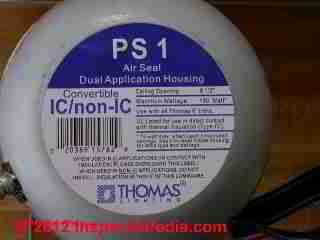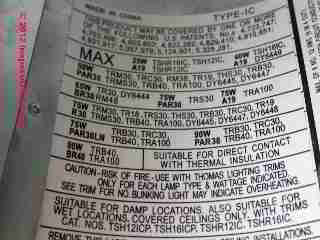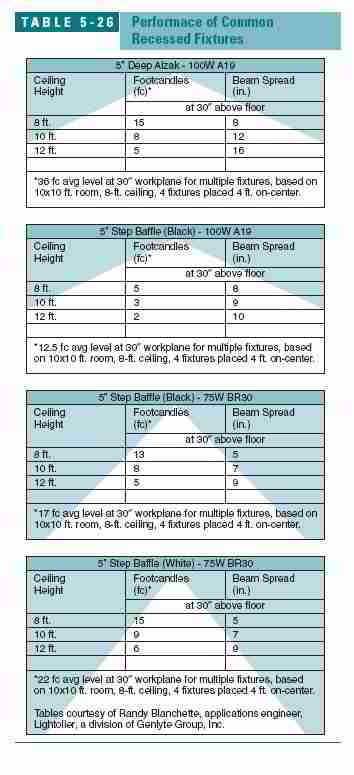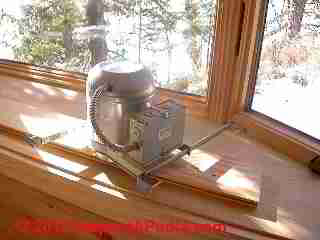 Guide to Clearance Distances & Housing Types for Recessed Lights
Guide to Clearance Distances & Housing Types for Recessed Lights
- POST a QUESTION or COMMENT about recessed light housing & trim types
Recessed light housing types & applications:
Here we explain the different types of recessed lighting fixtrures and their fixture trims. We provide a table of recessed light housing types and their recommended uses. We name, define, and explain the different types of recessed light housing trims.
This article series details guidelines for selecting and installing interior lighting to meet the requirements for different building areas.
InspectAPedia tolerates no conflicts of interest. We have no relationship with advertisers, products, or services discussed at this website.
- Daniel Friedman, Publisher/Editor/Author - See WHO ARE WE?
Guide to Recessed Light Housings
[Click to enlarge any image]
This article includes excerpts or adaptations from Best Practices Guide to Residential Construction (Steve Bliss, J Wiley & Sons) , by Steven Bliss, courtesy of Wiley & Sons. O
Also see LIGHTING, INTERIOR GUIDE our home page for information about all lighting topics relating to building interior
Typical residential recessed lights come in 4- to 7-inch diameters and can take a variety of different trims that significantly affect light output and glare.
For general lighting, a 5- to 7-inch diameter housing is commonly used. For accent lights, smaller 4-inch housings are available for both line-voltage and low-voltage figures. Special recessed housings are also available for compact fluorescents, sloped ceilings, and retrofit installations.
Standard recessed housings must be left uninsulated above. For insulated ceilings, use a can rated IC for “insulation contact.”
Also make sure the housing is rated “airtight,” which is not true of all IC units. Air leaks through recessed lights can be a significant source of heat loss and moisture problems in cathedral ceilings.
ur photo (left) gives details of information provided on the label of an IC/non-IC recessed light housing.
Recessed Lighting Fixture Trims
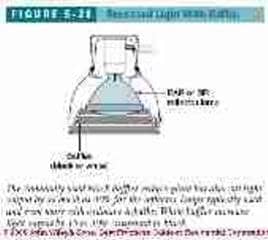
The common black or white
step baffles are designed for use with a PAR or BR lamp, although
homeowners often put in the less expensive A19
bulbs.
Baffles reduce glare, but also cut light output by 50% or more for A lamps and up to 40% for directional lamps. Black baffles cut light output significantly more than white (Figure 5-28).
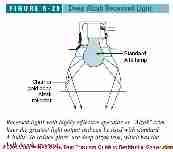
For maximum light output from a recessed lighting fixture, use a clear or gold specular reflector, also known as Alzak trim.
To reduce glare, which can be a problem with these highly efficient reflectors, it is best to use a deep-profile Alzak trim, offered by most recessed lighting manufacturers.
These work well with standard A19 bulbs as well as BR lamps (Figure 5-29). Gold Alzak is about 10% less efficient than the clear style.
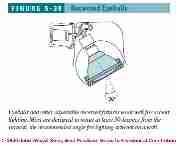
For accent lighting, eyeballs and similar adjustable trims allow the homeowner to direct the light to the artwork or architectural feature being lit (Figure 5-30).
These are typically used with a narrow spot to provide bright focused light on a small area.
Slotted wall wash trim is used to splash diffused light on broad areas of wall or bookcases.
Nondirectional A lamps or compact fluorescents work well in this application. General recommendations for recessed lighting bulb wattage or bulb type and fixtrure spacing are given in Table 5-25.
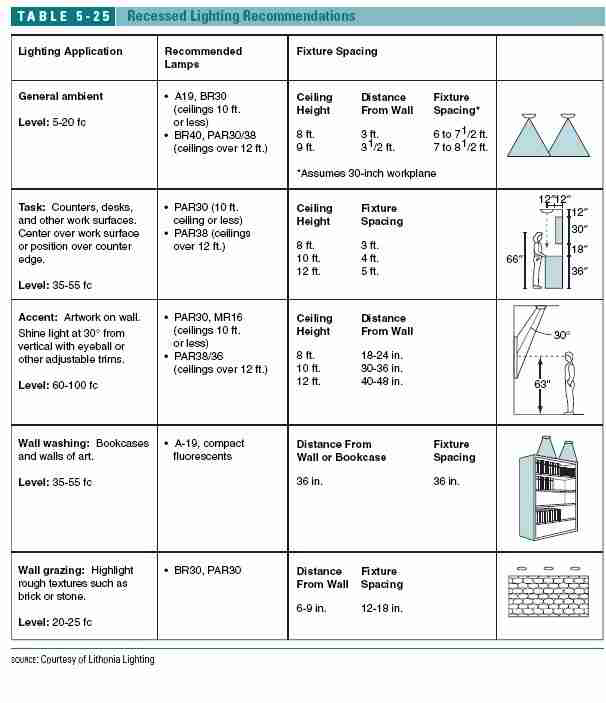
Spacing Guidelines for Light Fixtures
The general rule for ambient or task lighting is to space recessed ceiling fixtures approximately the same distance apart as the beam spread at the work height, typically assumed to be 30 inches above the floor (36 inches for kitchen counters). The beam spread is the central cone of light, where the beam is at least 50% of the brightness at the center of the beam.
Most manufacturers publish beam spread data for their recessed lights with different trim options. Beam spreads and lighting levels for some common fixtures and lamps are shown in Table 5-26.
Details about recessed light clearances to insulation or combustibles are at RECESSED LIGHT CLEARANCES
For ambient lighting, choose a compact fluorescent, A lamp, or wide flood with a beam angle of at least 50 degrees. Typical spacing for ambient lighting with recessed lights is 6 to 7 1/2 feet for an 8-foot ceiling, or 7 to 8 1/2 feet for a 9-foot ceiling. Spacing from the first row of lights to the wall is half this distance.
For accent lighting, space recessed or track fixtures so
their light hits the wall at about 30 degrees. For lighting a
large wall area, the distance between fixtures should be
equal to or less than their distance from the wall (see Figure 5-23).
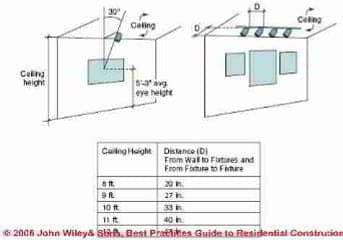
Watch out: Check with local code officials in your own jurisdiction for specific lighting and electrical safety requirements.
- - Adapted with permission from Best Practices Guide to Residential Construction (Steve Bliss, J Wiley & Sons) .
American Lighting Association www.americanlightingassoc.com
...
Reader Comments, Questions & Answers About The Article Above
Below you will find questions and answers previously posted on this page at its page bottom reader comment box.
Reader Q&A - also see RECOMMENDED ARTICLES & FAQs
Question:
(June 22, 2014) saqlain said:
specific drawing showing conduit ,junction box,light fitting are not shown.. lights for above and under the stair case is entirely missing.
Reply:
Saqib
You are commenting about electrical wiring in an article about spacing recommendations for recessed lighting. Electrical wiring connections, junction boxes and,the like are also discussed in detail at this website. Try the search box, or ask a specific question and we will try to assist you further.
Question:
(May 8, 2015) gail moore said:
I am trying to repair some soffit lights that were incorrectly installed at a church. The fixture itself is hanging down 1/2 inch further than it should be and there is no access available to raise the fixtures. Is there a replacement trim available with a deeper contoured trim that would hide the mistake and make the fixture look better that I could use in place of the flat trim there now?
Reply:
Gail
Have you first checked that the fixtures are securely in place?
If so you'll need the trim diameter needed as well as thickness to clear the 1/2" (if that's it) as well as the width of the trim ring needed.
Then see what's at your local building supply stores. Online several websites such as ferguson.com and lampsplus.com offer custom trims. One could fabricate a spacer out of found materials but it's safest to use non-combustibles.
...
Continue reading at RECESSED & TRACK LIGHT USES or select a topic from the closely-related articles below, or see the complete ARTICLE INDEX.
Or see these
Interior Lighting Articles
- LIGHTING, EXTERIOR GUIDE - home
- LIGHTING, INTERIOR GUIDE - home
- BATHROOM LIGHTING GUIDELINES
- BAYONET BASE BULB TYPES
- BULB & LAMP ABBREVIATIONS & CODES
- BULB & LAMP TYPES GUIDE - home
- BULB COLOR TEMPERATURE COMPRARISONS
- BULB & FIXTURE TYPES for SOFFIT
- CLOSET LIGHTING FIRE SAFETY
- ELECTRIC POWER LOSS / FLICKERING LIGHTS
- FLUORESCENT LIGHT REPAIRS
- KITCHEN LIGHTING REQUIREMENTS
- LED BULB & LIGHTING TYPES
- LIGHTING LEVELS INDOORS, RECOMMENDED
- LUMENS DEFINITION COMPARISON
- RECESSED LIGHT CLEARANCES
- RECESSED LIGHT HOUSINGS GUIDE
- RECESSED & TRACK LIGHT USES
- RECESSED & TRACK LIGHT BULB GUIDE
- RECESSED LIGHT FIXTURE TRIM
- RECESSED SOFFIT or ROOF OVERHANG
- SPACING GUIDE for LIGHT FIXTURES
- TABLE TOP LIGHTING
- TASK LIGHTING
- LIGHTING OVER STAIRS & AT EXITS
- PRYNE RECESSED LIGHTS CATALOG 1950 [PDF]
Suggested citation for this web page
RECESSED LIGHT HOUSINGS GUIDE at InspectApedia.com - online encyclopedia of building & environmental inspection, testing, diagnosis, repair, & problem prevention advice.
Or see this
INDEX to RELATED ARTICLES: ARTICLE INDEX to BUILDING LIGHTING
Or use the SEARCH BOX found below to Ask a Question or Search InspectApedia
Ask a Question or Search InspectApedia
Try the search box just below, or if you prefer, post a question or comment in the Comments box below and we will respond promptly.
Search the InspectApedia website
Note: appearance of your Comment below may be delayed: if your comment contains an image, photograph, web link, or text that looks to the software as if it might be a web link, your posting will appear after it has been approved by a moderator. Apologies for the delay.
Only one image can be added per comment but you can post as many comments, and therefore images, as you like.
You will not receive a notification when a response to your question has been posted.
Please bookmark this page to make it easy for you to check back for our response.
IF above you see "Comment Form is loading comments..." then COMMENT BOX - countable.ca / bawkbox.com IS NOT WORKING.
In any case you are welcome to send an email directly to us at InspectApedia.com at editor@inspectApedia.com
We'll reply to you directly. Please help us help you by noting, in your email, the URL of the InspectApedia page where you wanted to comment.
Citations & References
In addition to any citations in the article above, a full list is available on request.
- Steve Bliss's Building Advisor at buildingadvisor.com helps homeowners & contractors plan & complete successful building & remodeling projects: buying land, site work, building design, cost estimating, materials & components, & project management through complete construction. Email: info@buildingadvisor.com
Steven Bliss served as editorial director and co-publisher of The Journal of Light Construction for 16 years and previously as building technology editor for Progressive Builder and Solar Age magazines. He worked in the building trades as a carpenter and design/build contractor for more than ten years and holds a masters degree from the Harvard Graduate School of Education. Excerpts from his recent book, Best Practices Guide to Residential Construction, Wiley (November 18, 2005) ISBN-10: 0471648361, ISBN-13: 978-0471648369, appear throughout this website, with permission and courtesy of Wiley & Sons. Best Practices Guide is available from the publisher, J. Wiley & Sons, and also at Amazon.com - [3] Sal Alfano, "Air Sealing Recessed Lights - Sealing can lights will plug a major source of air leakage, but can also cause fixtures to overheat", The Journal of Light Construction, 28 January 2013, retrieved 6/8/2013 original souirce: https://www.jlconline.com//building-envelope/air-sealing-recessed-lights.aspx
- Our recommended books about building & mechanical systems design, inspection, problem diagnosis, and repair, and about indoor environment and IAQ testing, diagnosis, and cleanup are at the InspectAPedia Bookstore. Also see our Book Reviews - InspectAPedia.
- Best Practices Guide to Residential Construction, by Steven Bliss. John Wiley & Sons, 2006. ISBN-10: 0471648361, ISBN-13: 978-0471648369, Hardcover: 320 pages, available from Amazon.com and also Wiley.com. See our book review of this publication.
- In addition to citations & references found in this article, see the research citations given at the end of the related articles found at our suggested
CONTINUE READING or RECOMMENDED ARTICLES.
- Carson, Dunlop & Associates Ltd., 120 Carlton Street Suite 407, Toronto ON M5A 4K2. Tel: (416) 964-9415 1-800-268-7070 Email: info@carsondunlop.com. Alan Carson is a past president of ASHI, the American Society of Home Inspectors.
Thanks to Alan Carson and Bob Dunlop, for permission for InspectAPedia to use text excerpts from The HOME REFERENCE BOOK - the Encyclopedia of Homes and to use illustrations from The ILLUSTRATED HOME .
Carson Dunlop Associates provides extensive home inspection education and report writing material. In gratitude we provide links to tsome Carson Dunlop Associates products and services.


